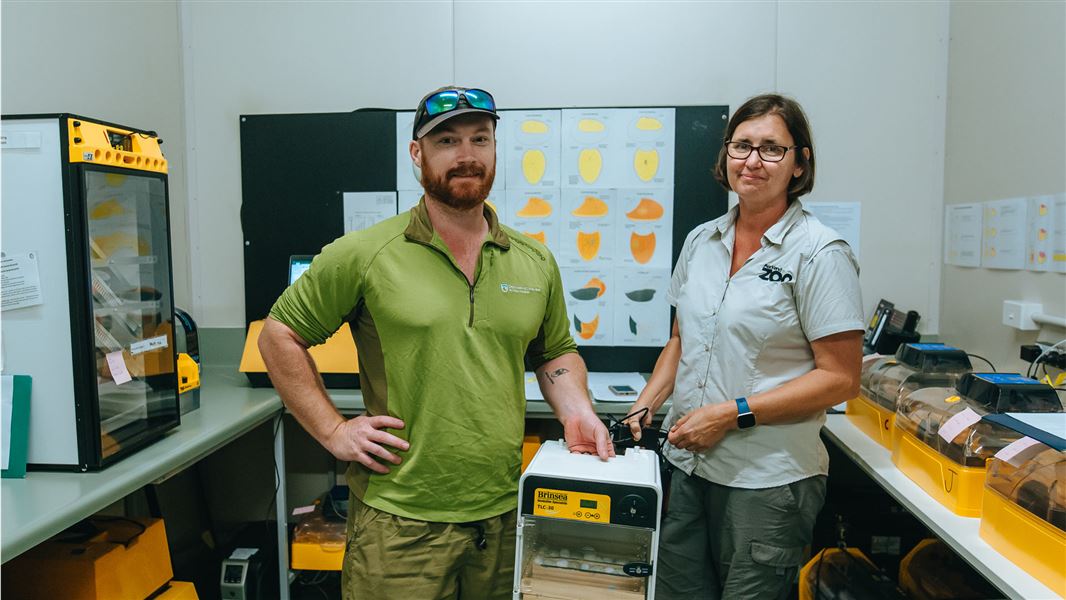Archived content: This media release was accurate on the date of publication.
Date: 14 December 2022
The unseasonably wet, windy and cool weather has interrupted the breeding season of one of New Zealand’s rarest birds, the tara iti/New Zealand fairy tern, with all eggs moved to incubation facilities at Auckland Zoo.
With fewer than 40 birds, the tara iti is nationally critical and has teetered on the brink of extinction since the 1970’s. Tara iti nest on shell and sand banks just above the high tide mark. This makes them vulnerable to rats, stoats, cats, and other predators, disturbance by people, 4WD vehicles and dogs. They are also at risk from stormy weather and very high tides, which are worsening with climate change.
DOC Biodiversity Ranger Shelley Ogle says: “We proactively collected seven tara iti eggs last week to help progress our rearing programme with Auckland Zoo, now in its third year. Days later, adverse weather hit the east coast causing the parents to abandon most of the nests which resulted in the team moving the remaining five eggs to the Zoo.”
The move to Auckland Zoo provides us a great opportunity to progress new techniques for intensive management and recovery, like artificial incubation and hand-rearing. It also shows the necessity of having these skills and facilities on-hand - in the past these eggs may not have survived in the wild.
“DOC and Auckland Zoo have embarked on a zoo-based hand rearing programme for tara iti because of the potential for this management action to increase the tara iti population. This is the second year of proactive collection of eggs for hand-rearing and much was learned from previous experience.”
“One chick remains in the wild and is doing well. Ideally our early proactive collection will allow the birds to lay again later in the summer and raise their own chicks, so our team of rangers and volunteers will remain on site carrying out pest control and monitoring the birds. Our DOC team will also support Auckland Zoo with the rearing of these chicks.”
“The tara iti are so rare and their eggs and chicks so vulnerable that the only real hope of recovering them is to maximise their reproductive success each year, and the best way to do this is intensive management,” says Auckland Zoo’s senior bird keeper Catherine Francescon. “Between the zoo-based rearing programme and the parents doing their best to raise chicks in the wild, we can hopefully see enough youngsters fledge each year that their numbers begin to grow.”
A dedicated team of tara iti DOC rangers and volunteers have been busy since September trapping predators near nesting sites, developing safe shell patches, and preventing nesting birds from being disturbed by human activities. DOC, alongside iwi and key stakeholders, has been developing a new recovery strategy for tara iti over the past few years.
This plan includes management of the vegetation, sand, and shell at each site to improve the quality of tara iti habitats and identifying and managing new sites for the birds. This is married with ongoing predator control, artificial incubation of eggs, and seasonal monitoring by DOC rangers and volunteers. The plan is informed by ongoing research into tara iti fertility, genetics, feeding, and improvements to data and field-based best practices.
Once widespread around the North Island and on the eastern South Island, tara iti now breed at only four nesting sites: Papakānui Spit, Pākiri Beach, Waipū and Mangawhai sandspits.
DOC works closely with Patuharakeke, Ngāti Wai, Ngāti Whātua o Kaipara, Ngāti Manuhiri, and Te Uri O Hau, The Shorebirds Trust, The NZ Fairy Tern Charitable Trust, About Tern, Birds NZ, and the Waipū Trapping Group, as well as Auckland Zoo, to help protect tara iti.
Support for the tara iti season has also been provided by the New Zealand Defence Force, Pākiri Beach Holiday Park, Tara Iti Golf Course, iwi and landowners at Pākiri, Auckland Council, and Armourguard.
To help tara iti:
- Stay out of fenced areas and used designated walkways
- Avoid shorebird nests and chicks
- Keep dogs on leads
- Remove bait, fish and rubbish to deter predators
- Drive vehicles below the tide mark
- If you are being chased, squawked at, or if a bird is on the ground pretending to be injured, you are too close to a nest
- If you find a nest do not touch it - the parent birds will be close by.
Contact
For media enquiries contact:
Email: media@doc.govt.nz
